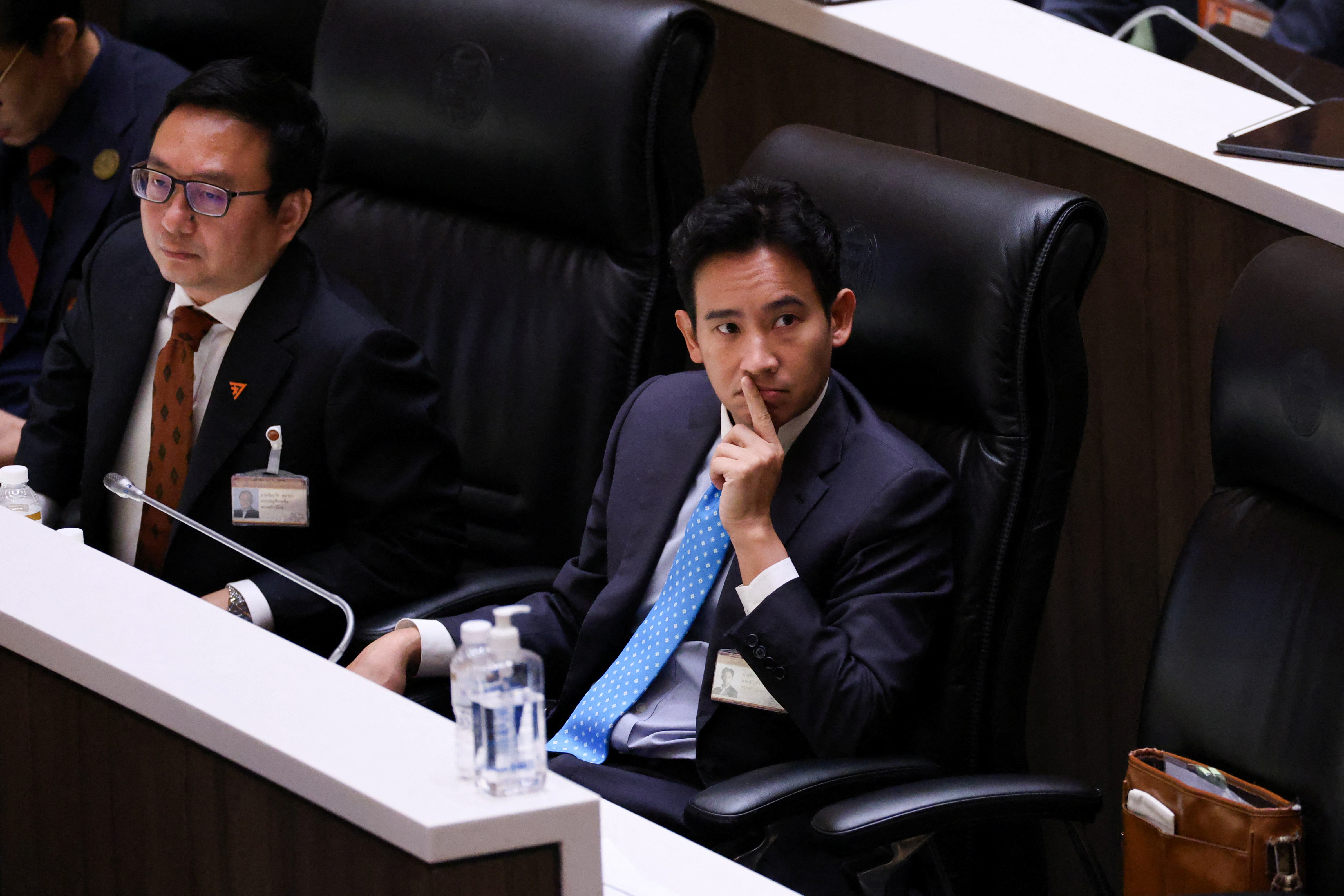
The bitter battle to name Thailand’s next prime minister took a major turn as parliament voted to deny Pita Limjaroenrat, whose progressive Move Forward Party won a surprise victory in May’s election, a second chance to be confirmed for the post.
Pita had assembled a coalition of parties holding a majority in the House of Representatives. But his nomination for prime minister was defeated in a joint vote of the House and Senate last week, with conservative military-appointed senators mostly refusing their support.
A joint session debated Wednesday whether Pita could be nominated for a second time, and House Speaker Wan Muhamad Noor Matha put the question to a vote. A motion to deny him a second chance was passed 395-312 with eight abstentions, dashing the hopes of Pita’s millions of supporters. The speaker told reporters that the second round of voting was scheduled for July 27.
The 42-year-old had told Reuters news agency in an interview on Tuesday that he was expecting “pre-planned” obstacles, describing efforts by the establishment to stop him as like a “broken record”.
Thailand has been run by a caretaker administration since March and 65 days have passed since Move Forward’s stunning triumph over military-backed parties in a May election, in what was widely considered a clear public rejection of nine years of government controlled by generals.
Hundreds of Pita’s supporters gathered peacefully in Bangkok to protest against the efforts to stop him, some carrying signs denouncing senators.
“I feel angry. They didn’t respect the people’s will,” said protester Wilasini Sakaew, 21. “They didn’t listen to the voices of 14 million people.”
Al Jazeera’s Florence Looi, reporting from Bangkok, said many are expressing “anger at what they see as attempts by pro-military elements to keep Pita out of power”.
“I’m very mad, we went through this four years ago, the country is going nowhere and democracy is still being abused,” a protester told Al Jazeera.
“What’s the point of having elections when you’re going to throw democracy down the toilet?”
‘Thailand has changed
Thai politics experts said Pita’s fall was virtually preordained by the 2017 Constitution, enacted under military rule and designed to undermine challenges to the established royalist order with measures such as giving the non-elected senators a role in confirming prime ministers. The charter’s specific target was the political machine of billionaire populist Thaksin Shinawatra, the former prime minister who the army ousted in a 2006 coup, but the rules can be used against any threat.
“The 2017 Constitution was designed to protect conservative interests in Thai politics, and what we are seeing is the Constitution in action. Pita’s fate, or that of any progressive movement, was largely sealed long before this election,” said Jacob Ricks, a political science professor at Singapore Management University.
It was the second blow suffered by Pita on Wednesday, after the Constitutional Court suspended him from parliament pending its ruling on whether he violated the Constitution by running for office while holding shares in a media company, a charge he has denied.
The court’s announcement would have still allowed Pita’s nomination and selection as prime minister. That is now ruled out by the action of the National Assembly or parliament, and Pita remains in legal jeopardy, subject to a possible jail term if the court rules against him.
Pita, during the debate on whether he could legally be renominated, said he would comply with the court’s order to step down from his parliamentary post.
“I think Thailand has changed, and will never be the same, since May 14,” said Pita, referring to his party’s election victory. “The people have won half the way. There’s another half left. Although I still won’t get to perform my duty, I’d like to ask all members to help take care of the people from now on.”
“Thank you very much,” he said before leaving the chamber to the applause of his supporters.
Pita’s chances of being named prime minister had already looked slim. He was rebuffed by all but 13 members of the appointed Senate, which along with the military and courts represents the country’s traditional conservative ruling class.
His party has pledged to amend a law that makes it illegal to defame Thailand’s royal family. Critics say the law, which carries a penalty of up to 15 years in prison, is often abused as a political weapon.
Move Forward, whose agenda appealed greatly to younger voters, also seeks to reduce the influence of the military, which has staged more than a dozen coups since Thailand became a constitutional monarchy in 1932, and big business monopolies.
After the vote to void Pita’s nomination, senior officials from the party and alliance partner Pheu Thai said they would arrange a meeting to decide their next move.
The planned prime ministerial vote was expected to be Pita’s last, after he announced that he would step aside if he failed and let political heavyweight Pheu Thai field its candidate in a third round.
“It is now clear that in the current system, winning public approval is not enough to run the country,” Pita posted on Instagram during the debate.







